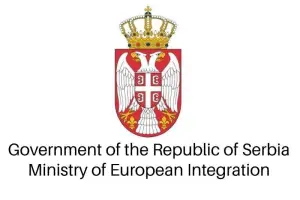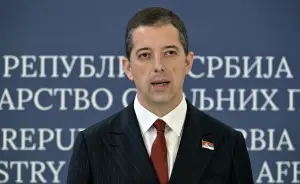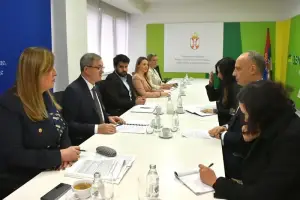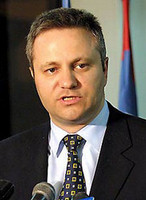- Serbia
Get to know Serbia
- Citizens
Culture and science
Health services
Pension and disability insurance
- Business
Employment
Economy
- Media
- Government
- Contact
Keep in touch
Contact form
Back
Keepin touch
Whether you have a question, comment, suggestion or any problem in the purview of the government, send us your message and we will try to respond as soon as possible. If your problem is not in our purview, we will forward your message to the relevant institution.
Q:
A:
Privatisation, economic restructuring, tax relief as greatest challenges for Serbia
Belgrade/Vienna,
11 January 2005
Serbian Minister of Finance Mladjan Dinkic said that the greatest challenges for Serbia in 2005 are privatisation, a restructuring of the economy and tax relief.
At a panel discussion entitled “European Club,” as part of the Economic Forum of Central and Eastern Europe, which takes place in Vienna on January 11 and 12, Dinkic spoke of the Serbian government’s economic policy for 2005 and measures aimed at accelerating the process of EU accession. He said that Serbia’s problems lie in the current transactions abroad. He said that overcoming this problem can be achieved through a speeding up of the privatisation process, corporate restructuring and by luring foreign investments.
Dinkic pointed out that there is a high level of interest in the privatisation of the banking and telecommunications sectors, adding that the telecommunications sector has three options – sale of Mobtel 063, possible privatisation of Telekom 064 and the granting of a third license.
According to him, the telecommunications situation will be cleared up within the next six months, as the ownership status in Mobtel should be resolved by then.
An out-of-court settlement needs to be reached with one of the Mobtel holders, Dinkic said, noting that the state must preserve a majority stake. He said that if that isn’t the case, the state will wait for the arbitration process in Zurich to end, which will occur by autumn at the latest.
He noted that Serbia is the only Southeastern European country that does not have the presence of a large-scale foreign telecommunications company.
The 10th Central and Eastern European Forum gathers over 1,100 financial and corporate leaders, investors, bankers, finance ministers, central bank governors and representatives of international financial institutions.
During the conference, Dinkic is due to meet with his counterparts from other Central and Eastern European countries as well as representatives of sizable worldwide companies.
Dinkic pointed out that there is a high level of interest in the privatisation of the banking and telecommunications sectors, adding that the telecommunications sector has three options – sale of Mobtel 063, possible privatisation of Telekom 064 and the granting of a third license.
According to him, the telecommunications situation will be cleared up within the next six months, as the ownership status in Mobtel should be resolved by then.
An out-of-court settlement needs to be reached with one of the Mobtel holders, Dinkic said, noting that the state must preserve a majority stake. He said that if that isn’t the case, the state will wait for the arbitration process in Zurich to end, which will occur by autumn at the latest.
He noted that Serbia is the only Southeastern European country that does not have the presence of a large-scale foreign telecommunications company.
The 10th Central and Eastern European Forum gathers over 1,100 financial and corporate leaders, investors, bankers, finance ministers, central bank governors and representatives of international financial institutions.
During the conference, Dinkic is due to meet with his counterparts from other Central and Eastern European countries as well as representatives of sizable worldwide companies.
-
 Belgrade, 9 January 2026
Belgrade, 9 January 2026Importance of overcoming stalemate in Serbia’s negotiations with EU
-
 Belgrade, 6 January 2026
Belgrade, 6 January 2026Passenger safety absolute priority amid disrupted air traffic
-
 Belgrade, 5 January 2026
Belgrade, 5 January 2026Care for children, preservation of ties with our people in region among Serbia’s priorities
-
 Belgrade, 1 January 2026
Belgrade, 1 January 2026Đurić sends condolences over Crans-Montana accident
-
 Belgrade, 30 December 2025
Belgrade, 30 December 2025Construction of bridge near Bačka Palanka to create new opportunities for economic development
-
 Belgrade, 27 December 2025
Belgrade, 27 December 2025Construction of new Defence Ministry, Armed Forces General Staff building begins
-
 Belgrade, 25 December 2025
Belgrade, 25 December 2025Đurić speaks with Botsan-Kharchenko about current topics
-
 Belgrade, 24 December 2025
Belgrade, 24 December 2025Potential to increase exports of Serbian products, machinery to Egypt
-
 Belgrade, 24 December 2025
Belgrade, 24 December 2025Strengthening Foreign Ministry’s human resources priority in coming year
-
 Kraljevo, 24 December 2025
Kraljevo, 24 December 2025New 14-kilometre section of Morava Corridor inaugurated


